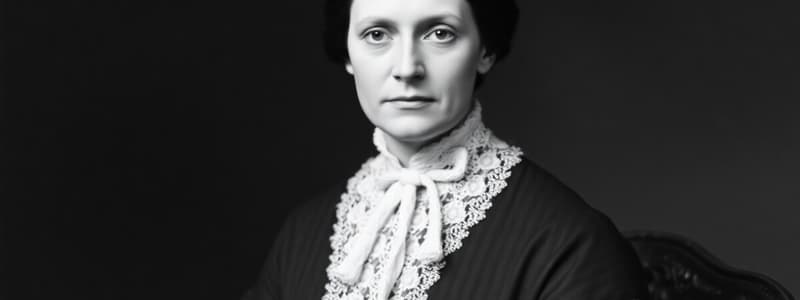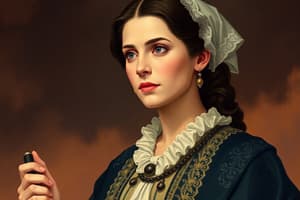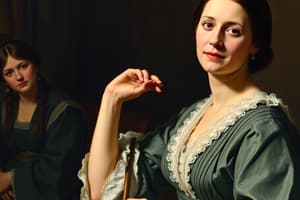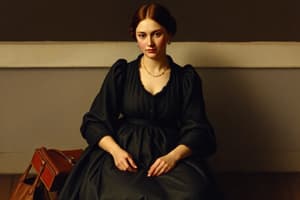Podcast
Questions and Answers
What was one of the main beliefs about women's roles in the early 1800s in the United States?
What was one of the main beliefs about women's roles in the early 1800s in the United States?
- Women were expected to pursue higher education.
- Women had equal legal rights as men.
- Women should primarily care for their husbands and children. (correct)
- Women were encouraged to own property independently.
What significant legal restriction did married women face in the early 1800s?
What significant legal restriction did married women face in the early 1800s?
- They could sign legal contracts.
- They were considered property of their husbands. (correct)
- They could vote independently.
- They could own their own businesses.
How did the Constitution influence voting rights in the United States in the late 1800s?
How did the Constitution influence voting rights in the United States in the late 1800s?
- It classified voting as an inherent male right. (correct)
- It included women in the right to vote.
- It prohibited voting based on gender entirely.
- It allowed all individuals, regardless of gender, to vote.
What impact did the New Jersey constitution of 1776 have on women's voting rights?
What impact did the New Jersey constitution of 1776 have on women's voting rights?
What roles were most women confined to in the early 1800s if they worked outside the home?
What roles were most women confined to in the early 1800s if they worked outside the home?
What motivated Lucretia Coffin Mott to speak out against slavery?
What motivated Lucretia Coffin Mott to speak out against slavery?
How did Lucretia Coffin Mott's upbringing influence her later activism?
How did Lucretia Coffin Mott's upbringing influence her later activism?
What was Lucretia's response to the exclusion of women from the World Anti-Slavery Convention?
What was Lucretia's response to the exclusion of women from the World Anti-Slavery Convention?
What significant difference did Lucretia observe in the education of girls compared to boys?
What significant difference did Lucretia observe in the education of girls compared to boys?
What is indicated by Lucretia's quote, 'I resolved to claim for myself all that an impartial Creator had bestowed'?
What is indicated by Lucretia's quote, 'I resolved to claim for myself all that an impartial Creator had bestowed'?
Why did Lucretia Coffin Mott and her friends sneak food to the boy in the closet?
Why did Lucretia Coffin Mott and her friends sneak food to the boy in the closet?
How did the Quaker belief system affect Lucretia's views on public speaking?
How did the Quaker belief system affect Lucretia's views on public speaking?
What action did Lucretia Coffin Mott take as a child that showcased her willingness to break rules?
What action did Lucretia Coffin Mott take as a child that showcased her willingness to break rules?
What key realization did Lucretia have regarding women's roles in public life?
What key realization did Lucretia have regarding women's roles in public life?
At the convention, which document was presented that echoed the sentiments of the Declaration of Independence?
At the convention, which document was presented that echoed the sentiments of the Declaration of Independence?
What was a point of contention at the convention regarding women’s suffrage?
What was a point of contention at the convention regarding women’s suffrage?
What did Lucretia’s attire symbolize at the convention?
What did Lucretia’s attire symbolize at the convention?
Which misconception about women's voting was discussed at the convention?
Which misconception about women's voting was discussed at the convention?
What was the primary focus of the two-day convention organized by Lucretia and her peers?
What was the primary focus of the two-day convention organized by Lucretia and her peers?
What was a unique aspect of the convention's approach towards male attendees?
What was a unique aspect of the convention's approach towards male attendees?
What was Lucretia's stance on participating in government-related civil rights battles?
What was Lucretia's stance on participating in government-related civil rights battles?
Flashcards
Quakers
Quakers
A religious group emphasizing inner religious experience and equality for everyone. They believe in speaking in church based on the divine inner spirit.
Slavery
Slavery
A system where people are forced to work without pay and are treated as property.
Lucretia's stance on slavery
Lucretia's stance on slavery
Lucretia Coffin Mott strongly believed that slavery was morally wrong and should be abolished immediately.
World Anti-Slavery Convention
World Anti-Slavery Convention
Signup and view all the flashcards
Exclusion of women at the World Anti-Slavery Convention
Exclusion of women at the World Anti-Slavery Convention
Signup and view all the flashcards
Women's protest at the World Anti-Slavery Convention
Women's protest at the World Anti-Slavery Convention
Signup and view all the flashcards
Lucretia's childhood
Lucretia's childhood
Signup and view all the flashcards
Lucretia's views on education
Lucretia's views on education
Signup and view all the flashcards
Declaration of Sentiments and Resolutions
Declaration of Sentiments and Resolutions
Signup and view all the flashcards
Why women shouldn't vote
Why women shouldn't vote
Signup and view all the flashcards
Women's role in public life
Women's role in public life
Signup and view all the flashcards
Pacifism
Pacifism
Signup and view all the flashcards
Civil Rights and Pacifism
Civil Rights and Pacifism
Signup and view all the flashcards
Seneca Falls Convention
Seneca Falls Convention
Signup and view all the flashcards
Women's Rights Movement before suffrage
Women's Rights Movement before suffrage
Signup and view all the flashcards
Women's Rights in Early 1800s America
Women's Rights in Early 1800s America
Signup and view all the flashcards
Fourteenth Amendment and Voting Rights
Fourteenth Amendment and Voting Rights
Signup and view all the flashcards
New Jersey's Early Voting Laws
New Jersey's Early Voting Laws
Signup and view all the flashcards
Lucretia Mott: Advocate for Women's Rights
Lucretia Mott: Advocate for Women's Rights
Signup and view all the flashcards
Quakerism: Action, Not Quiet
Quakerism: Action, Not Quiet
Signup and view all the flashcards
Study Notes
Lucretia Mott's Life and Activism
- Lucretia Coffin Mott was born on January 3, 1793, and died on November 11, 1880.
- She was a Quaker. Quakers believed that everyone had a divine inner spirit and anyone could speak in church
- Mott was raised on Nantucket and was instilled with the idea that women could speak freely.
- Mott broke rules at school to help a boy, demonstrating her rebellious nature.
- She managed her family's store when her mother traveled.
- She taught at a school in Millbrook, NY, where she observed unequal treatment of girls and teachers.
- Mott became a traveling speaker for the Quaker movement as an adult.
- She spoke out against slavery and believed it should be abolished immediately.
- Mott believed that if the principles were right, why should people be cowardly on this matter.
Mott's Involvement in the Anti-Slavery Convention of 1840
- Lucretia Mott attended an Anti-Slavery Convention in London in 1840.
- Male delegates did not allow women to participate in the convention. They were not allowed to speak or participate in the discussions.
- Women were seated behind a curtain.
- Mott and other women protested this decision by building a fire in the room they sat in
Mott's Meeting with Elizabeth Cady Stanton
- Lucretia Mott met Elizabeth Cady Stanton in 1848 at a friend's house in Seneca Falls, NY.
- Mott and Stanton were outraged with the treatment of women.
- They held a two-day convention (July 19, 1848) on women's rights.
- Three hundred people attended, including men.
The Declaration of Sentiments and Resolutions
- Attendees at the Seneca Falls Convention drafted a document modeled after the Declaration of Independence.
- It was called the Declaration of Sentiments and Resolutions.
- The document challenged the oppression of women and advocated for equality.
- It demanded equal rights for women
- Including the right to vote
Studying That Suits You
Use AI to generate personalized quizzes and flashcards to suit your learning preferences.




